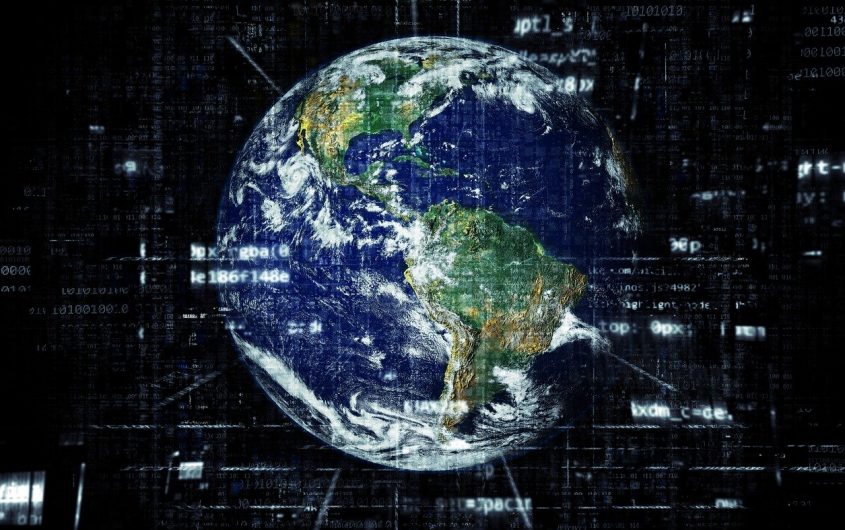
Pete Linforth from Pixabay
The Coming of A Digital Iron Curtain? The EU’s March toward Digital Sovereignty

Yixiang Xu
China Fellow; Program Officer, Geoeconomics
Yixiang Xu is the China Fellow and Program Officer, Geoeconomics at AGI, leading the Institute’s work on U.S. and German relations with China. He has written extensively on Sino-EU and Sino-German relations, transatlantic cooperation on China policy, Sino-U.S. great power competition, China's Belt-and-Road Initiative and its implications for Germany and the U.S., Chinese engagement in Central and Eastern Europe, foreign investment screening, EU and U.S. strategies for global infrastructure investment, 5G supply chain and infrastructure security, and the future of Artificial Intelligence. His written contributions have been published by institutes including The Chinese Academy of Social Sciences, The United States Institute of Peace, and The Asia Society's Center for U.S.-China Relations. He has spoken on China's role in transatlantic relations at various seminars and international conferences in China, Germany, and the U.S.
Mr. Xu received his MA in International Political Economy from The Josef Korbel School of International Studies at The University of Denver and his BA in Linguistics and Classics from The University of Pittsburgh. He is an alumnus of the Bucerius Summer School on Global Governance, the Global Bridges European-American Young Leaders Conference, and the Brussels Forum's Young Professionals Summit. Mr. Xu also studied in China, Germany, Israel, Italy, and the UK and speaks Mandarin Chinese, German, and Russian.
__
On August 6, President Trump issued dual executive orders banning the social media apps TikTok and WeChat in the U.S. in 45 days if they are not sold by their Chinese owners. TikTok, a social networking app for sharing short videoclips with up to 100 million users in the U.S., is under pressure to negotiate a possible sale to Microsoft within the tight timeframe to avoid pulling out of the U.S. market entirely. The move also threatens to cut off WeChat, a super-app that permeates daily life in China and handles everything from social media to digital payment to coronavirus tracking. For the Chinese diaspora in the United States, it is the only effective way to stay in touch with their families and friends back in China.
In both cases, while the details of prohibited transactions are still being drafted by the U.S. Department of Commerce, American businesses could also suffer from the abrupt decoupling. Some companies could find themselves suddenly alienated from their consumers in China and parts of Asia while others await likely retaliation from the Chinese government.
The orders also came a day after the U.S. Department of State announced an expansion of its Clean Network initiative that aims to extirpate Chinese communications technology products from the U.S. The administration’s ambitious new focus encompasses service carriers, software applications, cloud solutions, and undersea cables, and amounts to a full-throated attack on Chinese telecommunications and digital technology companies both at home and abroad.
Citing national security risks, the Trump administration has continued to wage an international campaign to keep the Chinese telecommunications technology company Huawei out of the world’s upcoming 5G network infrastructure—with limited success. Washington’s most recent moves allege severe data security and data privacy concerns and further expand the technology conflict between China and the U.S. and increase the likelihood of a splintered global internet.
Almost thirty years after the end of the Cold War, it seems a new digital Iron Curtain is being raised along geopolitical fissures between the world’s two digital superpowers. The Sino-U.S. technology rivalry could drastically alter the course of accelerating globalization in the digital age and bring about profound political, economic, and social challenges for the entire global community.
The Sino-U.S. technology rivalry could drastically alter the course of accelerating globalization in the digital age and bring about profound political, economic, and social challenges for the entire global community.
So, where does Europe stand on this budding digital divide? A data-driven digital global digital economy that disrespects national boundaries and operates largely according to its own rules challenges European regulators. Europe’s closer interconnectedness to the rest of the world through digital networks also presents European countries with new risks. The EU has tussled with U.S. internet giants over data access and is gearing up to fight Chinese digital surveillance and espionage. But Europe has long depended on China’s dominant position in information and communication technology (ICT) supply chains and U.S. leadership in software development for digital solutions. It also lacks homegrown digital champions like Google or Tencent that are influential in shaping the global digital ecosystem. Feeling outgunned and seeking to avoid being caught in the crossfire of the Sino-U.S. strategic competition, European leaders have embraced the call for digital sovereignty.
The European Union has sought to leverage access to the EU market and exercise its regulatory power to protect European interests. Brussels led the charge on data protection and privacy by implementing the General Data Protection Regulation (GDPR) in 2018, which forced companies around the world to comply with European practices of digital privacy. Seeing GDPR as a success, the European Commission is exploring European regulatory frameworks for AI and digital content.
There’s also an increasing sense of recognition in Europe that the EU cannot rely solely on its regulatory power to battle against Chinese and U.S. digital governance models. It must become a tech superpower in its own right. Some investments have been made in this front, with the notable example of the Franco-German-backed Gaia-X project which aims to create a globally competitive made-in-Europe cloud champion that upholds European values on data protection.
To successfully deal with the growing digital divide as a strong sovereign power, the EU still needs to do more. To start with, it needs to address the persistent challenge of forming a common position on strategic understanding of digital technologies among member states.
In the case of 5G rollout in Europe, despite the European Commission’s publication of the EU toolbox report for mitigating 5G cybersecurity risks early this year and a number of European countries, including Poland and France, having moved to exclude Huawei equipment for their national 5G networks, there’s no consensus across EU member states on the role of Chinese equipment vendors in Europe’s next generation networks. Germany, the bloc’s largest economy, has so far refused to ban Huawei, and Spain became the first country to grant a security clearance for 5G products to the company.
Disagreements over AI strategies among member states pose another potential problem for the bloc’s tech ambitions. For instance, France designates the military application as an important element of its AI strategy, while Germany views AI application mainly through economic lenses. Differing views on AI’s social-economic impacts as well as divergent emphasis on AI deployment carry the risk of stretching the bloc’s resources and diminishing returns on investments.
Differing views on AI’s social-economic impacts as well as divergent emphasis on AI deployment carry the risk of stretching the bloc’s resources and diminishing returns on investments.
Improving enforcement of its digital regulations is another crucial task for Brussels. While the GDPR demonstrated EU’s regulatory prowess, concerns linger over its lack of enforcement. A patchwork of national regulators and deep-seated interests for attracting global tech giants in countries like Ireland and Luxembourg greatly slowed the pace of GDPR enforcement, potentially undermining the entire regulatory framework. A case in point is ByteDance, which recently announced the establishment a data center for TikTok in Ireland. The move generated great uncertainty for separate investigations of the app by French, Dutch, and Danish data protection watchdogs as authority shifts to Dublin.
In addition, the EU should adapt its market competition rules and industrial policy to stimulate the organic growth of European digital champions that possess the resources to scale up and compete globally as well as boost domestic manufacturing capacity for critical components in ICT supply chains. Brussels should also push its vision of an open market for digital services at home as well as seeking greater reciprocity in foreign markets. If Europe succeeds in fortifying and exercising its digital sovereignty, it could become a formidable force that helps the world avoid a digital Iron Curtain.








